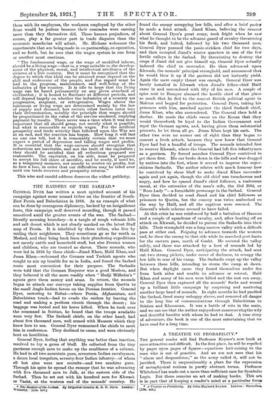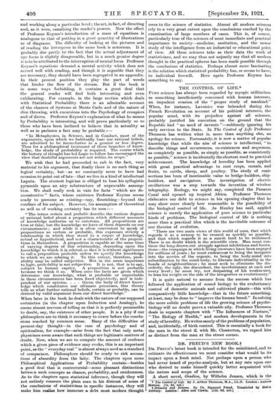A TREATISE ON PROBABILITY.* Tae general reader will find Professor
Keynes's new- book at once attractive and difficult. In the first place, he will be repelled by pages upon pages of figures—equations hair-raising to the man who is out of practice. And we are not sure that his " alarm and despondence," as the army called it, will not be justified. There is unquestionably a place for the expression of metaphysical notions in purely abstract terms. Professor Whitehead has made out a more than sufficient case for Symbolic Logics. But there remains an art of making books. This art is in part that of keeping a reader's mind at a particular fame
• d Treatise on Probability. lly John Maynard ffeynee. London : Macmillan. 118a. net.j
and working along a particular level ; the art, in fact, of directing and, as it were, canalising the reader's.powers. Now the effect of Professor Keynes's introduction of a mass of equations is analogous to that of putting in a great quantity of illustrations or of diagrams. The difficulty of looking at the pictures and of reading the letterpress in the same book is notorious. It is probably due partly to the fact that the actual adjustment of eye focus is slightly disagreeable, but in a much greater degree it is to be attributed to the interruption of mental focus. Professor Keynes's equations demand a mental activity which does not accord well with reading, and though it is arguable that they are necessary, they should have been segregated in an appendix.
In their present position they play the part of weeds that hinder the flow of the stream. But if the book is in some ways forbidding, it contains a great deal that the general reader will find both interesting and even exhilarating. For example, in the large section which deals with Statistical Probability there is an admirable account of the chances of Systems at Monte Carlo and of the nature of dice throwing, with excursions into the Psychology of croupiers and of dicers. Professor Keynes's explanation of what he means by Probability is interesting, and will prove particularly so to those who have been inclined to believe that in actuality as well as in parlance a fact may be probable :-
" In Metaphysics, in Science, and in Conduct, most of the arguments, upon which we habitually base our rational beliefs, are admitted to be inconclusive in a greater or less degree. Thus for a philosophical treatment of these branches of know- ledge, the study of probability is required. The course which the history of thought has led Logic to follow has encouraged the view that doubtful arguments are not within its scope."
We wish that he had proceeded to rub in the fact, very material to his argument, that finally there is no such thing as logical certainty, but—as we constantly seem to have had occasion to point out of late—that we live in a kind of intellectual Laputa. The sternest logician is obliged to base his syllogistic pyramids upon an airy substructure of unprovable assump- tion. We shall really seek in vain for facts " which are de-
monstrative " facts, whose existence Professor Keynes seems ready to presume as existing—nay, flourishing—beyond the confines of his subject. However, his assumption of theoretical as well as of working certainty has its uses :-
" The terms certain and probable describe the various degrees of rational belief about a proposition which different amounts of knowledge authorise us to entertain. All propositions are true or false, but the knowledge we have of them depends on our circumstances ; and while it is often convenient to speak of propositions as certain or probable, this expresses strictly a relationship in which they stand to a corpus of knowledge, actual or hypothetical, and not a characteristic of the proposi- tions in themselves. A proposition is capable at the same time of varying degrees of this relationship, depending upon the knowledge to which it is related, so that it is without significance to call a proposition probable unless we specify the knowledge to which we are relating it To this extent, therefore, prob- ability may be called subjective. But in the sense important to logic, probability is not subjective. It is not, that is to say, subject to human caprice. A proposition is not probable because we think it so. When once the facts are given which determine our knowledge, what is probable or improbable in these circumstances has been fixed objectively, and is inde- pendent of our opinion. . . . Given the body of direct know- ledge which constitutes our ultimate premisses, this theory tells us what further rational beliefs, certain or probable, can be derived by valid argument from our direct knowledge."
When later in the book he deals with the nature of our supposed certainties (in the chapter upon Induction and Analogy), he
seems almost nervous of telling us that it is perfectly permissible to doubt, say, the existence of other people. It is a pity if our philosophers are to think it necessary to cower before the conclu- sions reached by common sense. Many of the difficulties of present-day thought—in the case of psychology and of spiritualism, for example—arise from the fact that only meta- physicians seem aware that such things are legitimate matters of doubt. Now, when we are to compute the amount of credence which a given piece of evidence may evoke, this is an important point, as the everyday real " is almost always used as a standard of comparison. Philosophers should be ready to risk accusa- tions of absurdity from the laity. The chapters upon some Philosophical Applications of Probability contain—besides a good deal that is controversial—some pleasant distinctions between such concepts as chance, probability, and randomness.
As to the chapters upon statistical inference, though they will not entirely reassure the plain man- in his distrust of some of the conclusions of statisticians in specific instances, they will make him realize how immense a- debt most modern .thought owes to the science of statistics. Almost all modern sciences rely to a very great extent upon the conclusions reached by the examination of large numbers of cases. This is, of course, particularly true of the sciences of most immediate and practical importance to society—medicine, sanitation, and the newer study of the intelligence from an industrial or educational point of view. All these sciences take as their data the work of statisticians, and we may thus not unjustly say that all modern thought in the pradtical spheres has been made possible through the conclusions of statistics. Perhaps almost more fascinating is the relation which statistical probability has, or seems to have, to individual freewill. Here again Professor Keynes has something to say.



































 Previous page
Previous page